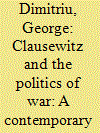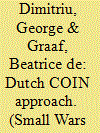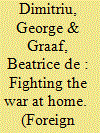|
|
|
Sort Order |
|
|
|
Items / Page
|
|
|
|
|
|
|
| Srl | Item |
| 1 |
ID:
173420


|
|
|
|
|
| Summary/Abstract |
This paper re-examines the theoretical underpinnings of Strategic Studies, proposing a novel theory and a new framework for analysing war’s fundamental relationship with politics in line with the Clausewitzian tradition. Throughout modern history, Clausewitz’s concept of politics has been misconstrued as referring only to policy whereas in fact, for him, ‘politics’ was a much broader concept, including domestic power struggles. The political logic of war is defined here as the convergence of the interrelating factors of power struggles and policy objectives within a given polity that restrains and enables these political forces. The analysis of the Clausewitzian political logic of war is conducted through the sociological ‘liquid modern’ lens. It is argued that with power increasingly shifting from centralised state-oriented political leadership towards market forces, non-state actors and other political bodies, the effectiveness of war has been reduced. This is evident in the fragmentation of Western political systems and, as a result, suboptimal strategy and the domination of domestic power struggles in political decision-making concerning war.
|
|
|
|
|
|
|
|
|
|
|
|
|
|
|
|
| 2 |
ID:
099856


|
|
|
|
|
| Publication |
2010.
|
| Summary/Abstract |
Rarely has a military commitment led to such intense discussion in the Netherlands as the Task Force Uruzgan (TFU) mission in Afghanistan. In February 2010, the Netherlands' coalition government even collapsed after the two largest parties failed to agree on the withdrawal of Dutch troops from Afghanistan later this year. This article deals first of all with the difficult discussion over the Afghanistan mission of the TFU. The authors then subject three ISAF operations to close scrutiny. The authors provide some suggestions to help understand better this pivotal point in the execution of the whole operation and thus give a fuller picture of the Dutch counterinsurgency approach in Uruzgan.
|
|
|
|
|
|
|
|
|
|
|
|
|
|
|
|
| 3 |
ID:
145094


|
|
|
|
|
| Summary/Abstract |
This paper analyzes the Dutch deployment in Uruzgan between 2006 and 2010 with an eye to the challenge of garnering public support for protracted military missions abroad. The hypothesis is that public support can be shaped and sustained by strategic narratives regarding the use of force. Ringsmose and Børgesen's model on strategic narratives is discussed and tested, and expanded in two ways. First, by including the role of “counternarratives,” that is, of narratives presented by factions that oppose deployment decisions. Our data suggest that narrative dominance (the combination of narratives and counternarratives) accounts for the waxing and waning of public support for a given mission. Second, the nexus between negative narrative dominance and the ensuing drop of public consent will be teased out. Using the notion of “elite responsiveness,” we demonstrate when and how weak strategic narratives trigger a political fallout.
|
|
|
|
|
|
|
|
|
|
|
|
|
|
|
|
| 4 |
ID:
123179


|
|
|
|
|
| Publication |
2013.
|
| Summary/Abstract |
The 9/11 attacks and the subsequent increase of counterterrorism laws and regulations in Western democracies have also spurned heavy debates on torture and ill-treatment of captured terrorist suspects. However, while the Netherlands did deploy troops to Afghanistan and adopted new laws and policies regarding counterterrorism, debates on torture remained marginal. Indeed, the Netherlands has not suffered the pressure of a constant high terrorist threat, or endured a catastrophic terrorist attack. However, the author argues that there are more reasons for the lack of heated discussions. While this article does not intend to lift the Dutch case to an exemplary one, it illustrates how Dutch government authorities made good use of the benefits of hindsight regarding torture debates and incidents elsewhere and were able to apply lessons regarding accountability and oversight concerning interrogation issues at home successfully.
|
|
|
|
|
|
|
|
|
|
|
|
|
|
|
|
|
|
|
|
|